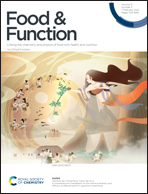Sodium butyrate alleviates intestinal injury and microbial flora disturbance induced by lipopolysaccharides in rats
Abstract
Bacterial endotoxin invasion reduces intestinal barrier functions, such as intestinal bacterial translocation and enteric infection. In this study, we investigated whether sodium butyrate (NaB) alleviates lipopolysaccharide (LPS)-induced inflammation by reducing intestinal damage and regulating the microflora. Rats were divided into four groups for the intraperitoneal injection of LPSs and intragastric gavage with NaB: Con, LPS, LPS + NaB, and NaB. The results showed that NaB alleviated intestinal villus injury and inflammatory infiltration caused by LPS. NaB supplementation decreased the mRNA levels of toll-like receptor (TLR)-4, tumor necrosis factor-α (TNF-α) and interleukin-6 (IL-6), and the trend was most pronounced in the jejunum. The morphology of the intestinal nucleus and mitochondria was further observed by transmission electron microscopy. The results showed that NaB supplementation alleviated LPS-induced nuclear atrophy, apoptosis, mitochondrial damage, and rupture. Moreover, NaB improved the LPS-induced inflammatory response by regulating the intestinal barrier. Furthermore, 16S rRNA sequencing showed that the LPS increased the abundance of the harmful bacterium Bacteroides, while the abundance of beneficial bacteria decreased. In the LPS + NaB group, the intestinal microbiota destroyed by the LPS was rebalanced, including a decrease in Bacteroides and an increase in Bifidobacterium and Odoribacter. In conclusion, NaB alleviates LPS-induced enteritis by regulating inflammatory cytokines, maintaining the mucosal barrier, and restoring the microbiota changes.



 Please wait while we load your content...
Please wait while we load your content...